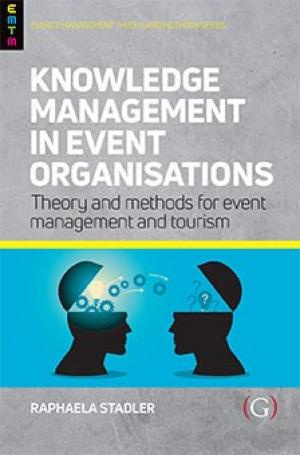
Knowledge Management in Event Organisations
Theory and Methods for Event Management and Tourism
Raphaela Stadler
ISBN: 9781911635444 HBK; 9781911635451 PBK; 9781911635468 eBook
DOI: 10.23912/9781911635444-4545
| | | | |
- Thoroughly explains generic knowledge management frameworks and their application and relevance to planned events and event tourism
- International case studies contributed by practitioners and other experts in the field at the end of chapters used to illustrate methods and applications.
- Online lecturer resources to accompany in the form of teaching ppt slides, end of chapter multiple choice questions and sample questions.
Provides an in-depth understanding of the challenging nature of events, where knowledge needs to be created and shared quickly and efficiently (pre- and during the event), as well as stored effectively post-event before the event organising team disperses. Generic Knowledge Management frameworks and models are introduced, applied and adapted to fit this challenging environment in order for event organisers to avoid ‘reinventing the wheel’ each year.
Knowledge Management in Event Organisations is the first book to:
- Encourage the adoption of standard knowledge management frameworks and methods in the field of event management;
- Provide concepts and frameworks that can be adapted to a range of different events and different stakeholders;
- Introduce the reader to alternative approaches to knowledge management, such as communities-of-practice, power/knowledge and Appreciative Sharing of Knowledge;
- Recommend best practices for event organisers to develop a collaborative ‘knowledge culture’ through, e.g. trust and mutual understanding, and hence develop professionalisation of the field;
- Develop a better understanding of how effective Knowledge Management can provide a competitive advantage for event organisations through, e.g. Efficiency, Innovation and Organisational Learning.
Part of the Event Management Theory and Methods Series. This series examines the extent to which mainstream theory is being employed to develop event-specific theory, and to influence the very core practices of event management and event tourism. They introduce the theory, show how it is being used in the events sector through a literature review, incorporate examples and case studies written by researchers and/or practitioners, and contain methods that can be used effectively in the real world.
With online resource material, this mix-and-match collection is ideal for lecturers who need theoretical foundations and case studies for their classes, by students in need of reference works, by professionals wanting increased understanding alongside practical methods, and by agencies or associations that want their members and stakeholders to have access to a library of valuable resources. Series editor: Donald Getz PhD., Professor Emeritus, University of Calgary, Canada.
With online resource material, this mix-and-match collection is ideal for lecturers who need theoretical foundations and case studies for their classes, by students in need of reference works, by professionals wanting increased understanding alongside practical methods, and by agencies or associations that want their members and stakeholders to have access to a library of valuable resources. Series editor: Donald Getz PhD., Professor Emeritus, University of Calgary, Canada.
Table of contents
Ch 1 Introduction, Concepts and Definitions; Ch 2 Knowledge Management Challenges in Event Organisations; Ch 3 Knowledge Management Activities, Models and Frameworks; Ch 4 Relational and Practice-Based Knowledge Management; Ch 5 Structural Elements of Knowledge Management; Ch 6 Cultural Elements of Knowledge Management; Ch 7 Power and Knowledge; Ch 8 Appreciative Sharing of Knowledge; Ch 9 Practical Implications and Recommendations for Event Organisers; References; IndexTable of contents
Ch 1 Introduction, Concepts and Definitions; Ch 2 Knowledge Management Challenges in Event Organisations; Ch 3 Knowledge Management Activities, Models and Frameworks; Ch 4 Relational and Practice-Based Knowledge Management; Ch 5 Structural Elements of Knowledge Management; Ch 6 Cultural Elements of Knowledge Management; Ch 7 Power and Knowledge; Ch 8 Appreciative Sharing of Knowledge; Ch 9 Practical Implications and Recommendations for Event Organisers; References; IndexAbout the authors
Raphaela Stadler isSenior Lecturer in Event Management, University of Hertfordshire, UK
Table of contents
Ch 1 Introduction, Concepts and Definitions; Ch 2 Knowledge Management Challenges in Event Organisations; Ch 3 Knowledge Management Activities, Models and Frameworks; Ch 4 Relational and Practice-Based Knowledge Management; Ch 5 Structural Elements of Knowledge Management; Ch 6 Cultural Elements of Knowledge Management; Ch 7 Power and Knowledge; Ch 8 Appreciative Sharing of Knowledge; Ch 9 Practical Implications and Recommendations for Event Organisers; References; IndexAbout the authors
Raphaela Stadler isSenior Lecturer in Event Management, University of Hertfordshire, UK
Sample files
Cover, copyright and contents.pdfChapter 1.pdf
Chapter 2.pdf
Chapter 3.pdf
Chapter 4.pdf
Chapter 5.pdf
Chapter 6.pdf
Chapter 7.pdf
Chapter 8.pdf
Chapter 9.pdf
Table of contents
Ch 1 Introduction, Concepts and Definitions; Ch 2 Knowledge Management Challenges in Event Organisations; Ch 3 Knowledge Management Activities, Models and Frameworks; Ch 4 Relational and Practice-Based Knowledge Management; Ch 5 Structural Elements of Knowledge Management; Ch 6 Cultural Elements of Knowledge Management; Ch 7 Power and Knowledge; Ch 8 Appreciative Sharing of Knowledge; Ch 9 Practical Implications and Recommendations for Event Organisers; References; IndexAbout the authors
Raphaela Stadler isSenior Lecturer in Event Management, University of Hertfordshire, UK
Sample files
Cover, copyright and contents.pdfChapter 1.pdf
Chapter 2.pdf
Chapter 3.pdf
Chapter 4.pdf
Chapter 5.pdf
Chapter 6.pdf
Chapter 7.pdf
Chapter 8.pdf
Chapter 9.pdf
Instructor Resources
Instructor Resources for each chapter. Includes lecture notes, sample short questions and sample longer essay-style questions.
KMManual01.pdf
KMManual02.pdf
KMManual03.pdf
KMManual04.pdf
KMManual05.pdf
KMManual06.pdf
KMManual07.pdf
KMManual08.pdf
KMManual09.pdf













